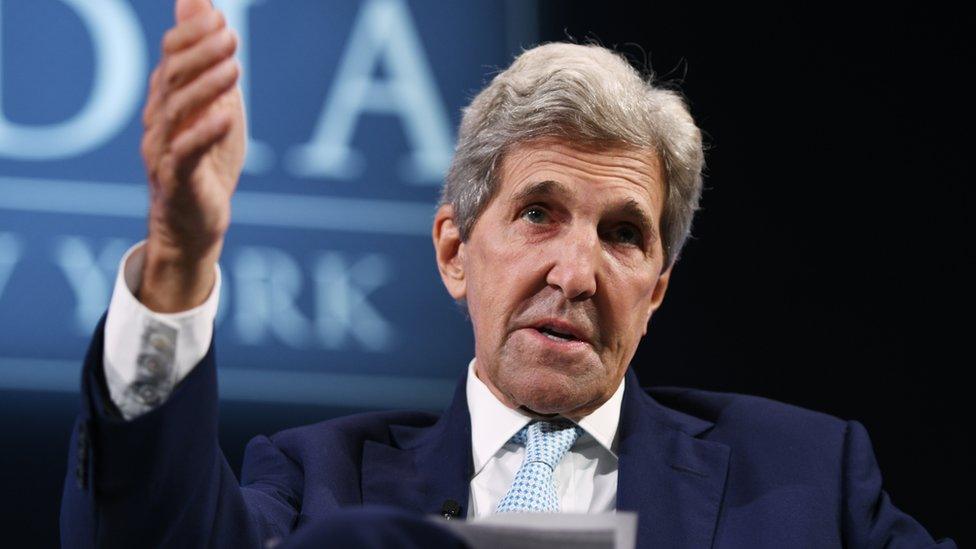Putin has not wrecked Glasgow Climate Pact - John Kerry
- Published
- comments
John Kerry says countries have to raise ambitions after COP26
US climate envoy John Kerry says the war in Ukraine has not wrecked the Glasgow Climate Pact agreed last year.
Russia's invasion has "presented a challenge" in the battle against global warming but could be overcome, he said.
Large reductions in carbon emissions are required if temperature rises are to be kept below 1.5C.
In a BBC interview, Mr Kerry said some countries needed to "raise ambitions" if the most dangerous effects of climate change were to be prevented.
According to a UN report, the world is on track to warm by 3.2C this century if countries only follow through on commitments made before the Glasgow summit.
This would lead to "unprecedented heatwaves, terrifying storms, and widespread water shortages".
To avoid that fate, the world must keep the rise in temperatures at or under 1.5C this century, researchers have said, and reach peak CO2 emissions by 2025.
Speaking to BBC Scotland's No Hot Air podcast, Mr Kerry said the COP26 climate summit in Glasgow was "enormously successful in raising ambition".
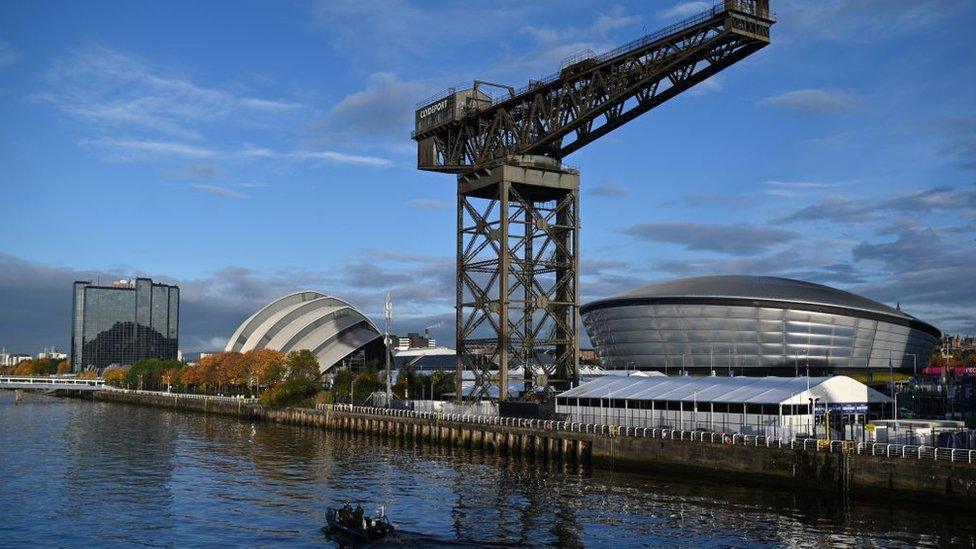
Around 120 world leaders came to COP26 in Glasgow in November 2021
He said if all the commitments made by nations at the summit were fulfilled, Earth "would be at 1.8 degrees of warming by 2050", but there has "not been enough movement to implement those promises".
"The bottom line is we're in trouble right now unless we can turn things around faster over the next eight years," he said.
"We have to still fight for the 1.5, as hard as it may be. But I remain an optimist, because I think that if we do what we've promised to do, we can have a 45% global cut globally between now and 2030."
COP26 President Alok Sharma said in January that the agreements reached at the Glasgow climate meeting had been a "fragile win" for the world but progress made during the summit was at risk of "withering on the vine".
Since the climate summit in November, Vladimir Putin's invasion of Ukraine, has led to disruption in global fossil fuel supplies and increasingly widespread sanctions against Russia by Western countries.
Mr Kerry said: "He hasn't wrecked [the climate pact], but he's presented a challenge to it."
He said there remained a question mark over what would happen with Russia's emissions, but the war had forced Europe to act faster.
Worst consequences
"What Vladimir Putin has done by using gas energy as a weapon, is to convince Europe that it has to move faster," Mr Kerry said.
"So, in fact, Europe is going to try to move to deploy renewable energy, wind, solar, etc, much faster than they originally had planned.
"The key will be finding greater levels of finance on an international basis to accelerate the transition to those renewables so that investment begins to move there faster."
He said hopes for a limit of global warming at 1.5C were weak but "still existing".
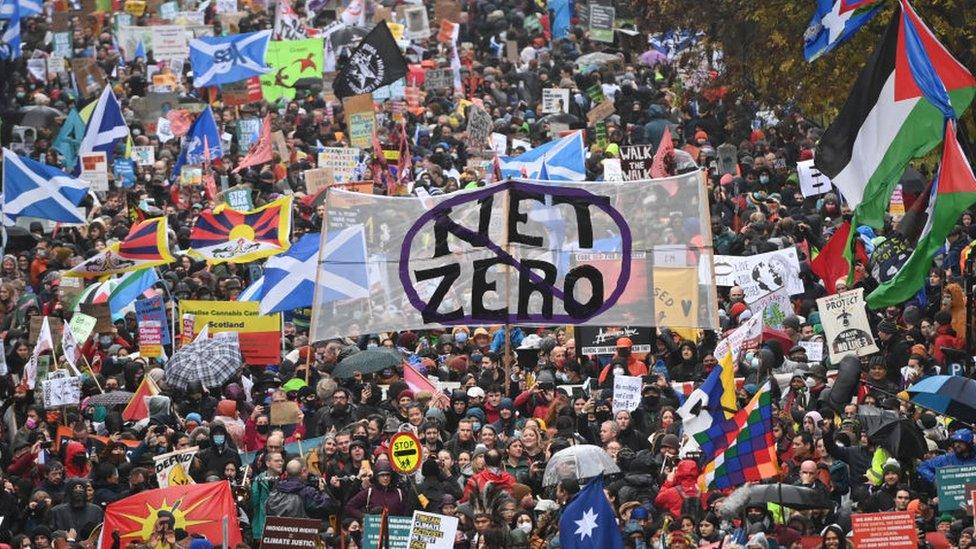
Tens of thousands of people protested during the COP26 summit demanding action on climate change
However, Mr Kerry said a 1.5C rise would avoid only the the worst consequences of climate change, not the crisis.
"We need to get to work," Mr Kerry said. "We need to deploy far more renewables. We need to be accelerating research and development. We need to be living up to the promises that we've made.
"We still can do that, and we have to get about the business of enforcing it."
In the US, President Biden hoped to get legislation for a "very reasonable but appropriately ambitious programme" through Congress at some point soon, Mr Kerry said, but he had the ability to use an executive order if that did not happen.
Tipping point
Mr Kerry said he would continue in his role as climate envoy.
"What motivates me is the fact that we can win this battle," he said.
"I must stay at it while I feel like I'm moving it forward and I can be most effective in what I'm trying to do."
He added: "The downside of not achieving what we have to achieve is that things will happen that are irreversible.
"We pass the tipping point, which some scientists think we may have passed, of the Arctic, of the Antarctic, of coral reefs, of any of them being... disaster and catastrophe."
Lang Banks, of the conservation charity WWF Scotland, said there remained a "giant gap" between global action and what science called for to limit global temperature rises to 1.5C.
He said the climate promises made in Glasgow had to be heeded, and that "urgent, ambitious and robust action from industrialised nations" was needed to limit emissions.


The world has changed in the six months since Glasgow hosted the UN climate summit, COP26. Global warming is no less a threat but rising energy prices made worse by the war has shifted political priorities.
For some countries, securing alternatives to Russian oil and gas supplies is a more pressing concern than cutting carbon emissions.
John Kerry - who describes himself as an optimist - thinks it should be possible to do both.
He argues that Vladimir Putin has weaponised Russian energy and in doing so has convinced Europe to speed up a switch to renewables that will help tackle climate change.
He also acknowledges Glasgow's wider goal of keeping alive the possibility of limiting the global temperature rise to 1.5C may be in trouble.
That has always required some countries, ideally including China and India, to increase their carbon-cutting ambitions in 2022 and that simply hasn't happened yet to anything like the required degree.

- Published24 January 2022

- Published29 December 2021
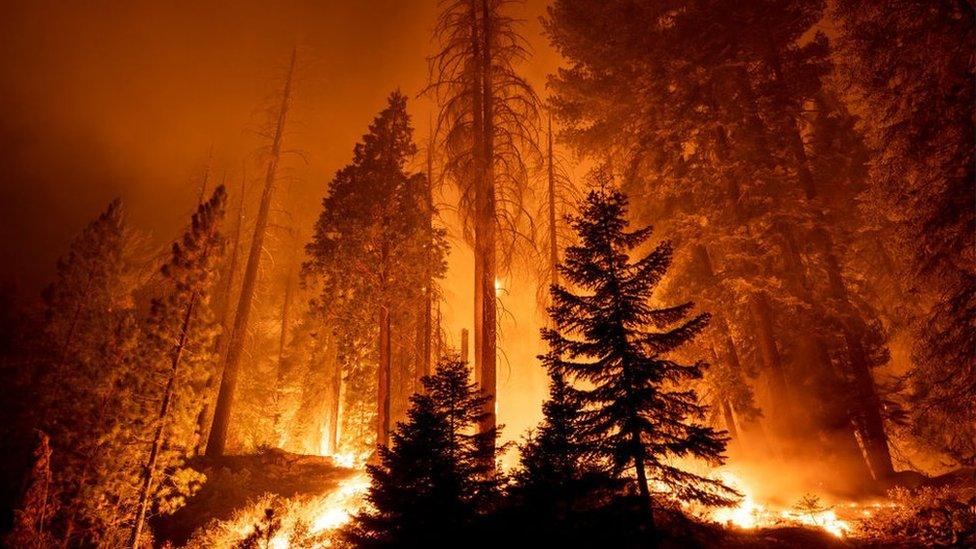
- Published15 November 2021
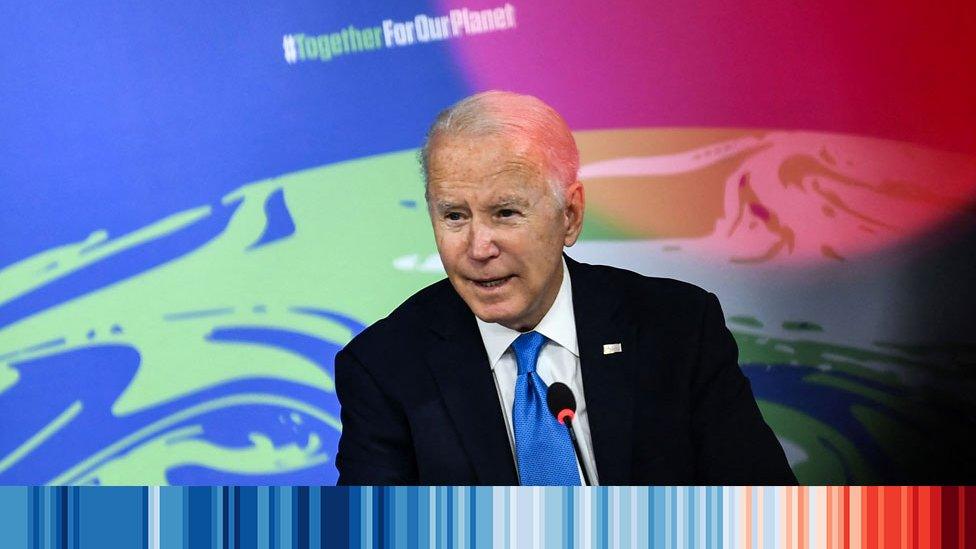
- Published19 October 2021
